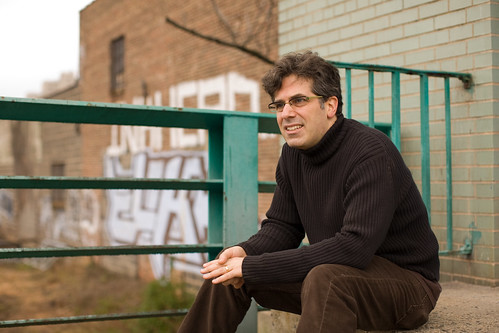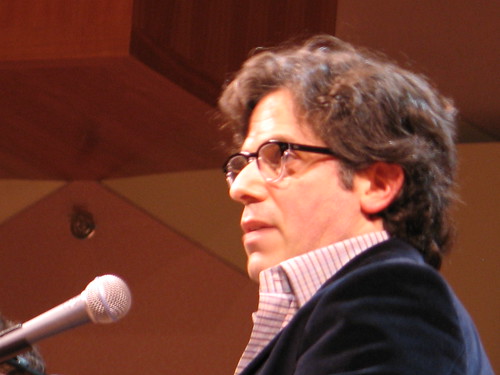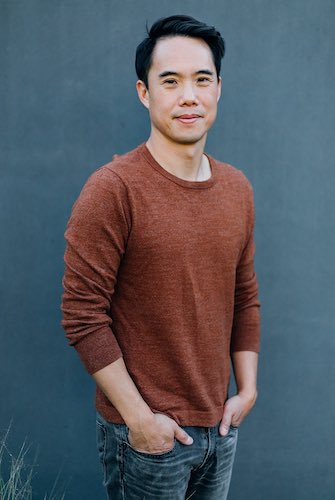Jonathan Lethem is one of a very small number of contemporary writers who can be considered household names, even in houses not inhabited by novelists. And for good reason. Lethem has written eight novels, three collections of stories, two books of essays, and has contributed to dozens of edited anthologies, journals and magazines, garnering as many awards along the way. But you knew that already, from your household.
In March, 2011, Lethem was the Zell Distinguished Writer in Residence at the University of Michigan, and I had the opportunity to interview him over breakfast one morning. Now here’s the rub: Jonathan Lethem has talked about everything. A quick Google search will reveal his patient and thoughtful responses to such varied interview questions as “…is relativism your philosophical stance?” and “Do you find incessant rain, like that which at the moment has us hiding and scurrying, defeating or oddly comforting?”
Despairing of finding an incisive question about his work that he has not already addressed somewhere online, I decided instead to follow up on tidbits he’d mentioned during his visit to our program, especially those I found of particular interest to us MFA-types. And also, as a displaced Brooklynite, I indulged in some banter about my favorite city in the world with the writer who captures it like no one else can. (Read on to find out how New York is akin to a “giant Ponzi scheme.”) Lethem is, after all, New York’s most notable exile.
Interview
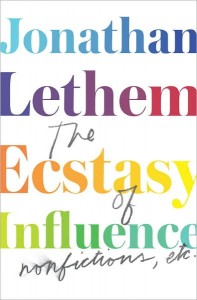
Roohi Choudhry: I wanted to start by talking about your “Promiscuous Stories” project and the related Harper‘s essay that seems to be at the core of the upcoming collection of essays you’ve mentioned, The Ecstasy of Influence.
Jonathan Lethem: Yes, although it’s maybe deceptive. That essay is at the center of this new book, it gives it its title. And the spirit of that essay from the perspective of the writer who collaged it together—this sort of magpie approach to culture—pervades the whole book. But the subject of what you might say “copy-left” gestures, including my own copy-left gesture of creating that “Promiscuous Materials” project, really doesn’t come up, except in one very brief section about the writing of that essay itself.
The “Promiscuous Materials” are funny. I keep wanting to point out to people that, along with the many things I’ve done that are not original—that’s another one of them! Writers give things away all the time. A painter or playwright friend might take inspiration or directly adapt something that their writer friend does and say, “Do you mind?” And the writer says, “No.” I didn’t invent giving things away. All I did was point to it; I put a name on the gesture and bragged about it a lot and created the website.
On the whole, my experience with having written that essay, “The Ecstasy of Influence,” and having made those gestures—I ended up for a little while being one of these copy-left advocates who goes around talking about this all the time. It was interesting for a little while and then I felt that the people who were convinced got it. I admire people who can devote themselves to advocacy—it’s a teaching role, to reorganize people’s thinking or open up people’s access to information again and again along the same few lines. I do it in teaching, but there I do it about the aesthetics of fiction. Making stories. That I could talk about forever. The fact that I believe that copyright laws are dumb, is something I find I’m not actually interested in talking about forever.
The thing that interested me about this project is also about the aesthetics of fiction, though. I’m interested in how it connects with what we were talking about earlier this week: the idea of a kind of pre-professionalism becoming more rampant with MFA culture. We’re in an MFA program, but we’re also aware of the limitations and problems with that. And so, even though this collaborative impulse is not an original thing, even if it’s been done for all time, I wonder if some of that is now changing because of this pre-professionalism, becoming professionals [as writers] earlier, as we all in this community compete with each other for the same goals.
This, I would say, points to something that is much wider than the sphere of writing, per se, or even the arts. And that is the business paradigm, the capitalist vocabulary where everything is a zero-sum, competitive, Darwinian struggle for bottom-line success. It’s this disease in our culture in every way. It affects the way people think about things like the education of little children, or their own participation in the social arena, or even in family life. The business model pervades everything. When I was growing up, it wasn’t obligatory that every news story, every situation be followed by the “marketplace” equivalent—“Okay, now what will this mean for the stock market?” The fact that the New Yorker has a page of market analysis trivia every week. Or a writer like Malcom Gladwell, who basically writes about how social and aesthetic and interpersonal experience can be quantified and commodified. His specialty is showing you the business paradigm underlying all sorts of apparently non-commodifiable situations.
[Malcolm Gladwell, on spaghetti sauce]
The dominant nonfiction writer at the New Yorker when I was a kid was John McPhee, who wrote about rocks.
This ideology—and it is an ideology—is really, really potent. It overwrites all other ways of looking at experience. And it has to be assiduously battled, rolled back, from areas that are precious to you, in order that you can even see them clearly and dwell in them in good faith. So when you talk about pre-professionalism in MFA programs, or competition, I don’t think, “Oh gosh, MFA programs are so corrupt.” I think, “How tragic to hear of another description, which is basically the same larger description of things being looked at only through that lens.” It’s the only language that the culture validates for evaluating things. It’s as though anything else would be like magical thinking. Ideals like the commons, that’s not esoteric or religious or magical. That’s another framework being squeezed out by the ideals of privatization and commodity.
But to look at the truth of an arts culture—it’s the realm of participation in a commons, where only some gestures can be successfully commoditized. And even then in a very scattershot and unsystematic way. The irony of talking about pre-professionalism, of course, is that it’s so peculiar to even talk about the life of a very successful writer, critically or commercial, as though they were a professional: credentialized, with a systematic approach to their success that really mimics the professions. Because it’s not a professional realm. It’s a kooky, eccentric, individual realm of different kinds of stances and attitudes and results utterly inconsistent even within the experience of a single writer. Let alone something you can take: “Oh, I’ll model how that writer is doing it and do it precisely that way.”
There’s this Writer’s Digest world where you’re supposed to professionalize and learn how to stuff the envelopes just the right way and make sure you always have seven stories out in the mail at any given time. It’s very poignant and not evil in any way. It’s quite charming and human: the urge to find some kind of industrious beaver-ish approach to becoming a published writer or managing your career once you’ve broken in with some articles. But that Protestant work ethic aspect of it is very silly in a lot of ways, too.
I like that you mention the Protestant work ethic. It feels particularly relevant because the MFA is such an American phenomenon to begin with. There are a few programs elsewhere now, but the idea is still so uniquely American, in some ways.
I’m a funny case in that I’m a grotesque workaholic. I do have my kind of practical side. I approach my own work with a constant attitude of demystification: this is a set of tasks, let’s just do this and break it down. So, in one sense, I happen to reflect an apparent devotion to the idea of writing as industry. But in my belief system, as opposed to my behavior, I think it’s a misunderstanding that what I’m doing, or what any of us are doing, is worth doing because it’s productive or redemptive or will be remunerative or edifying for others. It’s an area of deliciously useless—it’s a cultural realm. It’s a conversation. It’s a game and it’s joyous and it’s diverting and can be unexpectedly rich. It’s bottomless for me; I’ve fallen into it as if plummeting through a bottomless chasm of fascination and experience.
It’s taught me everything I know – caring about books, writing them, talking about them, has become a life. But I’m not working in an assembly line manufacturing cars, nor am I a doctor curing cancer. Which is not to devalue what I do but to say, it simply has some different aspects. Art-making, cultural participation exist outside of the realm of the utilitarian world, and have to be looked at differently and talked about differently.
I think that’s a really useful way to frame it, especially for those of us at a program.
And also, writers as apprentices, and afterward as well, have to remember this aspect of play, mischief, freedom, that detaches from the idea of responsibility or usefulness. If, at some point the results [are like] “last night a DJ saved my life;” if at some point, I talked someone back from a ledge, or made someone treat another human being more sensitively. I’m not renouncing a potential received-use value in my work, although it would be a difficult kind to predict or quantify. But to work as though the reason it’s okay to spend your time locked in a room alone making up stories about imaginary people is because you’re helping humanity—you’re going to make crappy, crappy art and probably be miserable, too. Because the suspicion that you couldn’t have picked a less direct way to help humanity will be creeping up over you and making you feel guilty all the time. That remorse will destroy your confidence. You have to disenchant that nonsense. The problem is that, in a culture that is so Protestant-work-ethic, people have a great deal of trouble accepting that they’ve chosen a path of less contribution than putting their shoulder to raising the barn.
In some ways, it’s an immigrant work ethic, belonging to the new world. Because–you’re forming a new society, what are you doing for this new society? That pressure seems constant.
I think that’s true. Absolutely. It’s the American story, and it’s a very interesting one, very entrancing, which is why everyone reflects it. Not only naïve people; everyone feels this. It’s intense. Even I, growing up inside a hippie, bohemian, outsider perspective; my parents were also engaged with the Protestant work ethic in their different ways. Even if they sometimes seemed to be engaged by flying in the teeth of it. They were both, in different ways, dropouts in the mainstream. It was still a narrative that was hugely a part of their lives.
So, this goes together with busting up the present corporate, business paradigm, which is an even newer and more pernicious thing.
But underneath, it is this older story that provides its foundation. And that’s this utilitarian conceit: that art is okay to do because it can be somehow framed as a very productive or helpful human activity.
Because it’s enriching!
Yes, and people have misunderstood me in the past, and thought I was making a cry for a decadent perspective—very rarified and elitist art-for-art’s sake—that somehow seems an insult to the democratization of art, or an insult to the people who feel they have received use-value [from art]. I believe in the received use-value of art all the time. It’s saved my life a hundred times over. But not because the person who made it was thinking: “I’ve got to save that young man’s life!” That’s not how that happens.
And that can cause really un-complex decisions in making one’s art.
Or unnecessarily complex ones. Pretentious ones. Both. All sorts of bad art can come out of that.
What you say about art saving your life speaks to my next question. Because we were talking about the idea of subcultures earlier this week. I don’t want to cannibalize your lecture [“What I Learned at the Science Fiction Convention”] tomorrow too much. So less about conventions. But in that general context, I wanted to talk about the idea of finding subcultures as a refuge from alienation, and relating that to writing. Something you said in another interview made me think about this. You said that, most of the time, in your books, “language has disappeared, or someone has vanished, or memory has gone.” Which made me think of Essrog [the Tourette’s-afflicted protagonist of Motherless Brooklyn] and how he’s always touching people, kissing people, reaching constantly for something to fill that void. His language overflow seems to make up for an alienation, something missing. And I wonder how language and writing, and characters, have provided a mode of contact for you, in terms of finding, touching a subculture or community?
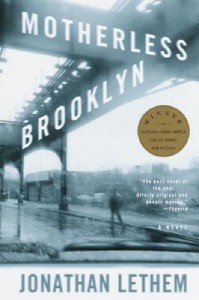 Ironically, you couldn’t know this, but you are cannibalizing my lecture, because that’s where I end up in that sequence I’ll read. For tomorrow night, I’ve put together some different parts of the essay book into one confessional essay about this yearning to connect that underlies the writing act. You just completely paraphrased a big chunk of it, in a way.
Ironically, you couldn’t know this, but you are cannibalizing my lecture, because that’s where I end up in that sequence I’ll read. For tomorrow night, I’ve put together some different parts of the essay book into one confessional essay about this yearning to connect that underlies the writing act. You just completely paraphrased a big chunk of it, in a way.
In that case, we can move on!
No, no, it’s great to talk about. There’s a peculiarity of the writer both feeling special or different from other people in some inchoate way, not always in a grandiose way, maybe feeling very inferior or alienated, but—apart. And, choosing then to deepen this situation, in a way, by the life procedure of writing, which is very isolating. To go away and to do this. We’re fundamentally social creatures, we’re born into families, we’re in a social context instantly. We’re not solitary selves to begin with. And that continues, we’re mostly creatures that understand ourselves in our tribes and in our families and in environments of others. It’s a pretty big strain on that experience to go away from the tribe as often as you need to, to begin to write and continue to write. It’s really uncomfortable.
In some ways, the MFA has become our tribe.
Sure, it’s another version of that. So again, you’re anticipating me because then the fact is, what do you do when you go off to this place? You think about the people you’ve taken yourself apart from and you make up stories about imaginary versions of people. You’re participating in a secret tribalism. And the world of books is a strange kind of surrogate social reality. I experienced it that way: as an enormous engine of loneliness-destruction, these lives that were speaking to me through the voices of novels and stories. The authors and the characters were this incredible reality of a social conversation that I was entranced by. That simultaneously took me out of daily life—my immediate physical opportunities of social connection—and replaced it with this vast, historical, exalted, strange, other conversation. But it was and it wasn’t simultaneously a replacement for what was being sacrificed.
And my own writing becomes another door back into the world. I wanted to speak back to those books. I wanted to have commerce with them. That was my strongest impulse: not to impress myself or others or to save lives, but to join the company, in a sense, of these voices. And just be among them. Gain a voice in a realm where a child struggles to acquire speech, and then the writer struggles to be audible to the world of books that he adores. It’s like your parents—a vast library of parents and you want to be heard by them. So I’ve always seen it in a social context.
But I’ve also always seen it as: this is my special chance, as a kid born into subcultures, very specifically. The fact that I had more than one made me really see, early on, the power and the function, and understand my attraction to them, and also my diffidence about them. Because I was simultaneously but never completely: a hippie, a Jew, a Quaker, an artist, and a New Yorker. And I was a weird kind of New Yorker, because Brooklyn is a subcultural identity in relation to the mainstream of New York City—to Manhattan.
And then there’s the Star Wars watched-twenty-one-times subculture.
Oh, that’s the subculture of one—fool. But actually, it’s quite relevant because, when I bumped into the fact that there was a science fiction subculture which I was completely unaware of, it was really like Columbus bumping into Puerto Rico. I was nineteen when I first gathered that there were people who organized themselves socially according to reading those books. I was just reading the books. I read a lot of science fiction, but I didn’t know there was a behavior.
Was that at college?
Yeah. I’d gone to one comic book convention as a teenager. So I’d glimpsed that there was a fan culture around comic books. But it was actually when I was 21 or 22 that I went to a science fiction convention. The fact is that I found it absurd and totally delightful at the same time because I found so many people interested in things I was interested in, and so persistently thought they were interested in the wrong ways. But good enough. Nobody’s subcultures are perfect.
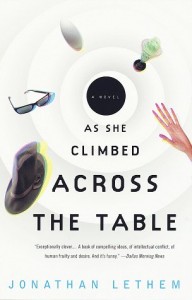 And it was only many, many years later that I [understood] so much of my attraction to it, and so much of my distressing way of behaving in that situation to myself and others. I wasn’t being mean or drinking a lot—I mean I was always talking about how we should dissolve the subculture. Which isn’t actually what subcultures want to do! I thought that was the goal. I was like: “I want to make science fiction more normal.” And they were all actually horrified by that.
And it was only many, many years later that I [understood] so much of my attraction to it, and so much of my distressing way of behaving in that situation to myself and others. I wasn’t being mean or drinking a lot—I mean I was always talking about how we should dissolve the subculture. Which isn’t actually what subcultures want to do! I thought that was the goal. I was like: “I want to make science fiction more normal.” And they were all actually horrified by that.
But it had to do with my own attraction and responsiveness to subcultures in general which was: to want to show them how they’re really just part of the human tribe. Or have their ideals disseminate. You know, the way the hippies were supposed to change everything and hadn’t managed to. I had found my new hippies! So I have a very strange fascination with and incompetent use of subcultures. I’m very drawn to them, and I’m very perplexed by the tribal reinforcements that they impose. The resistance to transmissions in or out from the outside world.
Interesting. As writers, we feel alienated and isolated, so are drawn to subcultures. But then we want them to be more like what we were running away from in the first place.
Yeah I think these conflicts are built in. I think it has a lot to do with American identity, which is this giant incoherent idea or set of ideals that can’t be resolved in a unified way. It can only be resolved sub-culturally. That’s why I include New York as one of the subcultures that I’ve experienced. People are understandably very fixated on New York’s arrogance and myopia. And these things are true. But also, growing up inside that world, I know how vulnerable and naïve and fearful of “elsewhere” you can be as a New Yorker. That it is a self-reinforcing sub-cultural identity of a certain sense. You know, that famous New Yorker cover image of Manhattan, where you see Tenth Avenue and Eleventh Avenue and Twelfth Avenue, and then the Hudson River, and then the vast plain with a few specks of light on it. One very familiar interpretation of that, and the dominant one, is that this shows the solipsism and narcissism of New York. But it also describes a helplessness and naïvete: “what IS out there?” It’s terror. New Yorkers can’t drive and they have to be proud of that, because there’s no other option but to act as though it’s a wonderful thing. But that’s helplessness and dysfunction.
So this is another version of sub-cultural brandishing your difference and even your weakness as your badge, your emblem. And I think a lot of American life resolves into certain versions of subculture. The people I know in rural Maine will say to me, “Not only have I never been to New York but I would never wish to go.” It’s just an inconceivable world. Well, Mainers don’t go to conventions where they wear nametags that say “I’m from Maine and my name is such-and-such.” But they are also participants in a sub-cultural identity as Mainer—specifically, this flinty, caustic, sea-salty, coastal Maine identity is a subculture. It may not have as many love beads as being a hippie, and it wouldn’t be very willing to see itself in the framework I’m proposing as analogous to MFA programs. But it’s another kind of sub-cultural choice that’s been made.
There are only subcultures, in a way, is what I’m saying, and then an idea of a whole or outside. Even “mainstream” literary authority—let’s just say, to be able to isolate more or less what we mean—the people who are routinely asked to write reviews for the New York Times Book Review and therefore, and let’s please understand that it is therefore, guaranteed that their own books will be reviewed by the New York Times Book Review, among whom I will now number myself. As hegemonic and oppressive as the assumptions that go with that, the degree to which that subculture has the privilege and utilizes the privilege of pretending there are no other literary cultures besides itself, it’s also still a subculture, where social reinforcements and tribal ritual prevail. And where a limited number of people are executing maneuvers amongst one another as though it is a whole world, but it’s not.
But then, the “weakness worn as a badge” idea is a less relevant sub-cultural idea there. Or maybe then, it’s a weakness as compared to Wall Street, or something.
Well, this is a very interesting question. What you then have is a ritual hand-wringing over the death of the novel, or the death of publishing. Which is a kind of a bogus victim-identity to substitute for or to basically blur the power assumptions of their privilege—or our privilege. Which is why I think those narratives are such fetishes. You know, that the novel has always just suddenly died, and publishing has always just suddenly extinguished itself. Because then you can mourn your loss of power, status, value, relevance, and that becomes your version of stigma or crisis. It’s crisis as identity politics. If you’re not, let’s say, Black or Asian or Transgendered, you can be a hurt, deposed king. I mean, that’s why I hate all the movies about the poor little royalty, because it’s this fetish.
Poor little royalty?
The King’s Speech. Our culture’s willingness to play certain games about exalting privilege and power by always finding ways to fill it with sympathy. It’s like the novel is equivalent to British royalty. Or, like we all have to clap our hands to keep Tinkerbell alive, because it would be so sad to see the mighty fall. And I just think, if the only good thing about the novel any more is that we remember how great it was, and we would be sorry and feel bad for it if it didn’t still feel great, then let it die. Let Tinkerbell die. That’s not why I cherish it.
So, I wanted to track back a bit to the idea of New York as a subculture. I find interesting this idea of “different New Yorks,” the many subcultures within it. There’s that E.B. White passage about the three kinds of New Yorkers—the native, the commuter, and the settler. I think it was up in the subway for a while. I’m curious about how you see yourself and your work fitting into that kind of system; the different ways those identities maybe interact in your work.
 I don’t have a lot of useful observations about how the culture of New York works as a whole because I have experienced it in such a miniaturist’s perspective, and so subjectively, and it’s been so different for me at different times in my life. I found myself writing about the idea, the projections of Manhattan, in Chronic City. But it still doesn’t equate to an E.B White-style diagnosis of the functions of that great city over time. It was more, for me, like trying to freeze a single impression basically of Manhattan in 2004, on the edge of the re-election of George Bush, and with the trauma of 9/11 settling very uneasily into the background, as the financial engine of the city revived. Of course, we now know that it was only reviving to crash precipitously.
I don’t have a lot of useful observations about how the culture of New York works as a whole because I have experienced it in such a miniaturist’s perspective, and so subjectively, and it’s been so different for me at different times in my life. I found myself writing about the idea, the projections of Manhattan, in Chronic City. But it still doesn’t equate to an E.B White-style diagnosis of the functions of that great city over time. It was more, for me, like trying to freeze a single impression basically of Manhattan in 2004, on the edge of the re-election of George Bush, and with the trauma of 9/11 settling very uneasily into the background, as the financial engine of the city revived. Of course, we now know that it was only reviving to crash precipitously.
In fact, my freeze-frame image of 2004 in retrospect becomes an image of a city in a delusory lull between the two traumas of 9/11 and the coming financial collapse. And that was enough: to try to think about: what I felt and saw in the life of Manhattan and some Manhattanites, and the city’s idea of itself. Or its avoidance of an idea of itself. Its will to be amnesiac, its will to erase reality in favor of a dream of privilege and glamour and decadence. That was enough to try to contend with. That was easily a 700-page novel. To try to think about very much more than that little freeze-frame is too much for me. I don’t have the capacity. That’s what I’ll say about my writing about Brooklyn, the most serious attempt obviously being The Fortress of Solitude: that I basically just took one grainy photograph of a certain block in Brooklyn on a certain summer day in 1973, and blew it up and blew it up, and looked harder and harder at it to try and fathom what I felt. And what it meant and what its implications were and how it got that way. And what about it could be sustained, and what about it was unsustainable. But it doesn’t mean that I understood Brooklyn historically. Even Brooklyn is much too big, much too conflicted, much too various.
Right, and I ask that question, even though it’s sort of unanswerable, because I’m coming from a completely settler perspective to New York, such a different New York from your books, which is partly why I was initially drawn to your work.
Well, the paradox of New York is captured in an interesting way in this conversation. Because, of course, there’s the yearning for a notion of authenticity and provenance. And I end up walking around with that credential, having accidentally printed out that credential, as having “street-cred” in some way; deep, inside knowledge. But my parents were arrivers in Brooklyn. Contrary to the widely-disseminated lie, I wasn’t even born in Brooklyn. I was born in Manhattan, then lived in Kansas City for a while. The fact is, New York is defined in many ways by the newer arrivals. The “natives” are often bystanders as New York is being enacted or reenacted or redefined by very new immigrants. Whether at the level of the desperate and hungry immigrant looking for a foothold in the new world. Or the “Euro-trash,” the privileged occupants from afar who come to make this fantasy place their fantasy place. And also, in the middle between those two extremes, the arriving artist class. The ultimate New Yorker is someone like Dawn Powell or Andy Warhol or Truman Capote. Who comes from the provinces, seizes this place, makes it their own, defines it. Because they recognize themselves in it, and could never imagine living anywhere else.
I’m the inversion of that. I grew up there, and I often can’t imagine living in New York. I run away from it compulsively. I don’t think that I’m as true a New Yorker in a funny sense as Andy Warhol, or my wife, who came there from St. Louis and fell in love with it and felt that this is the only place where the world was the way she’d grown up hoping it might be. That’s New York. It belongs to the arrivers. We sort-of natives, we children of New York, are more often its perplexed bystanders.
That’s essentially what E.B. White is saying in the passage. It’s interesting, and I suppose it’s what I want to believe, but aesthetically it seems definitely to belong to you.
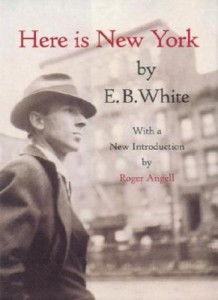 Oh, I’m very much of the place, and I think about it all the time. But it belongs to whomever seizes it at the instant. It’s a place that’s not about provenance. It’s about the present and the future. This is probably something of an oversimplification and historians could pick it apart, but I feel that if you want to look at real historical meaning, New York is the first secular city. It’s the first city built by enterprise and ideas and deal-making, as opposed to by some national or religious or authoritarian settlement. The defining moment in the founding of New York City as a place was the Dutch letting the Jews get in. And they didn’t do that because they liked the Jews. They did that because New York wasn’t sacred to them and the Jews were going to make useful deals. They were going to amp up the commerce.
Oh, I’m very much of the place, and I think about it all the time. But it belongs to whomever seizes it at the instant. It’s a place that’s not about provenance. It’s about the present and the future. This is probably something of an oversimplification and historians could pick it apart, but I feel that if you want to look at real historical meaning, New York is the first secular city. It’s the first city built by enterprise and ideas and deal-making, as opposed to by some national or religious or authoritarian settlement. The defining moment in the founding of New York City as a place was the Dutch letting the Jews get in. And they didn’t do that because they liked the Jews. They did that because New York wasn’t sacred to them and the Jews were going to make useful deals. They were going to amp up the commerce.
That decision is characteristic of New York. It’s replenished by avaricious, opportunistic growth-models. So now—here I am ending up with business language, which is just what I said [at the start] we had to overthrow; that we have to defeat business language. But New York, for better and worse—and I think for both—is a business place. And also, an illusion place. A fantasy-of-business place. It’s the center of Wall Street and of Madison Avenue. The literal core of the idea of the dream factory, of selling the sizzle not the steak. It’s virtual reality before virtual reality. It’s a place of projections. But not the projections of religious authority, or the power of kings, or the purity of nations. It’s a place of: “Come here if you can make the projection bigger. We’ll let you in, you weird people.” Because the deal is going to get bigger. It’s a Ponzi scheme, you know: “Keep ‘em coming in, we need more punters, we need more buyers, we need more sellers.”
New York is a huge Ponzi scheme?
Yeah.
That’s great. What are you working on now?
I’m writing about Queens, that’s my novel in the background. Soon as I finish the neatening-up work on this big, crazy essay book, I’m going to get back to it. I’ve got 150 pages, I’m just underway, of a book that’s another New York book. I guess, in some ways, if I was going to make a very crass blurb for it, I’d say it’s like a girl’s Fortress of Solitude. It’s my mother’s world in Queens and Greenwich Village in the fifties and sixties. But then, it will stumble forward all the way to the present.
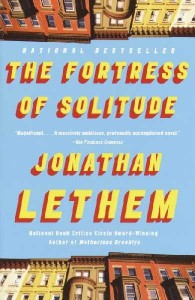 There are a lot of historical moments in the book. And some are the first time I’ve ever written something that tries to convey a mimetic authority, the classic naturalist authority over time periods I didn’t live through myself. That’s different for me. I had to do a lot of research to write about the seventies in The Fortress of Solitude, but I was researching stuff that my own senses had apprehended. I was just fleshing it out, confirming stuff, intuitions, reminding myself of what I already knew, really.
There are a lot of historical moments in the book. And some are the first time I’ve ever written something that tries to convey a mimetic authority, the classic naturalist authority over time periods I didn’t live through myself. That’s different for me. I had to do a lot of research to write about the seventies in The Fortress of Solitude, but I was researching stuff that my own senses had apprehended. I was just fleshing it out, confirming stuff, intuitions, reminding myself of what I already knew, really.
Can you talk about your process of doing that historical research?
You know, it’s weird. I was joking [earlier in the interview] about how silly it is to accuse of any writer of professionalism. I end up buying a lot of books that I don’t read. My research is often talismanic. I just surround myself with the possibility of knowing things, and then I guess about them instead. So I spend hundreds and hundreds of dollars on very difficult-to-find books about the political and social dichotomy of New York City and the outer boroughs specifically. Communists in Queens and labor unions in Canarsie. And then, they’re way too boring to read.
I’m glad I’m not the only one who does that.
What I often find—I guess this is a very Ecstasy of Influence thing to say—is that the best way into the mind of another American era for me, to really just make myself believe that I could feel and think like a character at the time, is to read a lot of novels from that time. Tremendous number of contemporary novels. Sometimes the same couple over and over again.
What are you reading for this project?
Well, I’m reading Norman Mailer. He’s very important to this book. I’m reading memoirs by radicals from that era, the waning days of New York communism. So, Vivan Gornick. I found an assortment of mostly out-of-print novels that capture some part of that milieu. Not famous books. And not always the kind of books that you think are unjustly out of print. You can understand why they’re not in print.
Are you someone who likes those processes to be simultaneous? The creating and the research?
Yes, because it’s too anxious and pedantic-feeling to just sit and read books and hold off the writing. You don’t know what you need to know anyway until you’re working. Somebody said: build the car out of the parts you have. Start going at it. You might have to stop and grab another part at some point, but start driving the car. Start driving the car.

